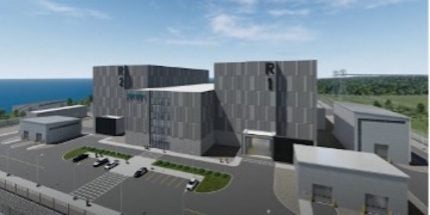
Viaro Energy, a London-based independent upstream oil and gas company operating in the UK and the Netherlands North Sea, has announced a strategic partnership with US-based Terrestrial Energy to deploy Terrestrial Energy’s Integral Molten Salt Reactor (IMSR), in the UK.
Viaro and Terrestrial Energy have signed a memorandum of understanding (MOU) to work collaboratively on IMSR plant technology for a broad range of potential industrial applications, including powering data centres for AI. These are applications which currently rely on fossil fuels.
Viaro and Terrestrial Energy will work to exploit commercial opportunities from the growing demand for nuclear as a supplier of clean electric power and industrial heat. They will initially evaluate siting, regulatory, macroeconomic and policy factors to confirm the viability of the project. They will then move to identification of target sites, followed by detailed evaluation and site selection.
The companies intend to form a joint venture for the delivery of the IMSR plant project in the UK, with Viaro providing the infrastructure and investment for the deployment, and Terrestrial Energy leading the nuclear system development and procurement activities.
The timelines for the project depend on various external factors, which will be assessed at agreed-upon milestones. However, the parties anticipate the project will reach a Final Investment Decision in 2030. An IMSR plant would create over 120 jobs when in operation, with many more during construction and in the plant supply chain.
“We have now spent a year conducting market research of the different nuclear technology providers, and we believe Terrestrial Energy’s IMSR technology is among the most competitive ones currently out there,” said Viaro CEO Francesco Mazzagatti. “The Terrestrial Energy team has successfully circumnavigated a lot of the production and supply chain challenges that other companies struggle with, such as fuel supply, and their experience in this sphere is impressive. Viaro has long stated its intentions to support the energy transition in a stable and strategic manner, and we continue to view safe nuclear energy as the most promising response to addressing climate change.”
Terrestrial Energy CEO Simon Irish said Viaro and Terrestrial Energy share a strategic vision that a large expansion of nuclear energy supply is required to achieve energy security and net-zero emission goals. He added that small and modular power plants employing advanced Generation IV technologies, such as IMSR, can lead this expansion. “Viaro has been successfully growing its market footprint in a core industrial sector while embracing the need for the energy transition, and we are excited about the potential that this partnership holds,” he noted. “With this MOU, we will work together on a project to select a site and an industrial application, which when completed would benchmark the capabilities of our IMSR plant and its potential for many other sites and applications.”
In April, Terrestrial signed a MOU with Schneider Electric to jointly develop commercial opportunities and advance the deployment of the IMSR technology for industrial heat and power supply. Schneider systems automate and optimise energy management for improved performance, efficiency, and contribute to the commercial and sustainability goals of its customers. The collaboration seeks to offer solutions to the major energy challenges faced by data centre operators and many heavy industries operating a wide range of industrial processes such as hydrogen, ammonia, aluminium, and steel production.
In August 2023, Terrestrial Energy signed a contract with Westinghouse’s UK subsidiary Springfields Fuels Limited for the design and construction of an IMSR fuel pilot plant. The Springfields nuclear fuel manufacturing site in Preston has extensive infrastructure available to support the fuel supply for IMSR development, and scalable to support a fleet of IMSR plants operating in the 2030s.
The IMSR uses Standard Assay Low-Enriched Uranium (LEU) enriched below 5% uranium-235, rather than High Assay Low-Enriched Uranium (HALEU) enriched to 5 to 20% uranium-235. LEU, which has international regulatory acceptance, is used in conventional NPP fuel and is readily available and transportable for civilian reactor use. The two companies believe this will support early deployment of IMSR plants across multiple markets, including providing power for industrial and data centre use in the US and European markets.
The IMSR design is for a 442 MWt per Core-unit (IMSR400) small modular molten salt fuelled, graphite moderated, thermal spectrum reactor. Terrestrial Energy has developed a two-unit configuration which can deliver 884 MWt/390 MWe. The design features a completely sealed reactor vessel with integrated pumps, heat exchangers and shutdown rods all mounted inside a single vessel.
The sealed Core-unit is replaced completely at the end of its useful service life (nominally seven years). This allows factory production levels of quality control and economy, while avoiding any need to open and service the reactor vessel at the power plant site. The IMSR400 achieves the highest levels of inherent safety as it does not depend on operator intervention, powered mechanical components, coolant injection or their support systems such as electricity supply or instrument air in dealing with upset conditions. It operates at the high temperature required for broad industrial relevance. The Canadian Nuclear Safety Commission in 2023 completed Phase 2 of its vendor design review process for the IMSR, finding no fundamental barriers to licensing the reactor for commercial use.






